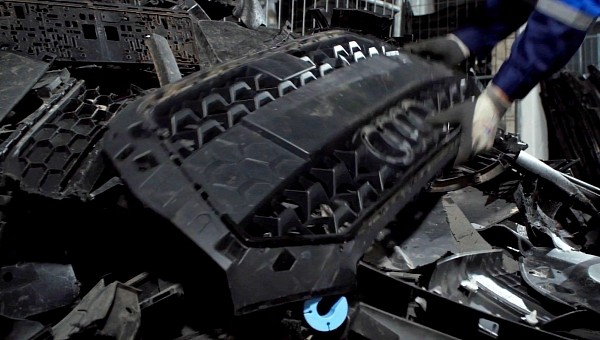Plastic injection molded components have played a vital role in automobile manufacturing since the 1970s. With less specific gravity and cheaper to produce, plastics have enabled manufacturers to reduce the weight of their automobiles, thereby increasing efficiency.
So too, has the recycling of plastic material contained in those components. An injection molding tool produces two components; a runner and the designed part. Think of the runner as the road leading up to a house and the component as the house. The runner is trimmed away from the house after the molding cycle ends. The runners are then ground down into very small pieces (re-grind) to be remixed with virgin material and re-run.
In some cases, a part's spec will include a regrind content maximum, while others will not, and still others will designate that no amount of regrind is acceptable. This is especially true with high-tolerance components. Plastic with several heat histories often times lacks the dimensionable integrity to meet tolerances.
Audi has taken a different approach to plastic recycling with the help of plastic resin manufacturer LyondellBasell to produce its Q8 e-tron seatbelt buckle covers.
As part of the PlasticLoop project, the buckle covers are made from recycled plastic with an innovative difference from the conventional approach outlined above. Plastic components are subjected to a chemical process known as pyrolysis oil, whereby the plastic compounds are broken down into their simplest form which is oil. That oil is then used to produce raw materials to create new resin materials in what the company calls a "mass balance approach."'
The process will allow Audi to stretch the utilization of fossil fuels to cut raw material costs without sacrificing on quality. The materials produced from the process are of the same quality standard as virgin materials and thus, create components that meet specified tolerances for fit and function.
In some cases, a part's spec will include a regrind content maximum, while others will not, and still others will designate that no amount of regrind is acceptable. This is especially true with high-tolerance components. Plastic with several heat histories often times lacks the dimensionable integrity to meet tolerances.
Audi has taken a different approach to plastic recycling with the help of plastic resin manufacturer LyondellBasell to produce its Q8 e-tron seatbelt buckle covers.
As part of the PlasticLoop project, the buckle covers are made from recycled plastic with an innovative difference from the conventional approach outlined above. Plastic components are subjected to a chemical process known as pyrolysis oil, whereby the plastic compounds are broken down into their simplest form which is oil. That oil is then used to produce raw materials to create new resin materials in what the company calls a "mass balance approach."'
The process will allow Audi to stretch the utilization of fossil fuels to cut raw material costs without sacrificing on quality. The materials produced from the process are of the same quality standard as virgin materials and thus, create components that meet specified tolerances for fit and function.






